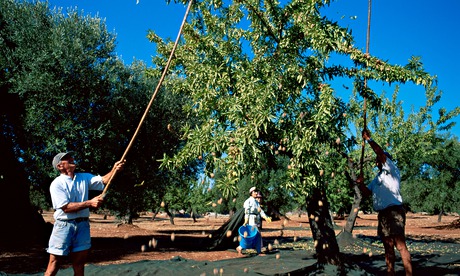Tony Blair will advise on controversial gas pipeline from Azerbaijan to Italy | Politics | The Guardian

Farm workers harvest olives in Puglia. Photograph: Alamy
On one side are Tony Blair, a powerful consortium of energy interests, including BP, and the autocratic ruler of a former Soviet bloc country. On the other are the olive growers of Puglia and a comedian turned political maverick.
News that Britain's former prime minister is to advise the consortium behind the Trans Adriatic Pipeline (TAP), the final leg of a 2,000-mile gas pipeline that will run from Azerbaijan across much of central eastern Europe, has sparked uproar among people living close to its ultimate destination in the heel of southern Italy.
Anger towards the pipeline – the pet project of Azerbaijan's controversial president, Ilham Aliyev – has been building up in Puglia for several years, with thousands attending public meetings and demonstrations opposing the project, which is due to start in 2016. Plans for the pipeline to come onshore in Brindisi were ditched following local opposition. The new route will strike land in the less populated municipality of Melendugno.
However, environmentalists claim that Puglia, which boasts two Unesco world heritage sites, will still suffer as a result of the pipeline's rollout. There are fears – which are rejected by the consortium – that the pipeline will contaminate fresh water supplies.
Other critics warn that the beach where the pipeline is due to come ashore will be turned into a building site, while the habitat of the local Mediterranean monk seals – one of the most endangered mammals in the world – will be threatened.
But TAP says it will not work on the beach in the summer months and that construction work will cease during the seals' mating season. It has also pledged to replant the olive groves belonging to some 150 families in the region. But because some of the trees are up to 2,000 years old, the olive-growers fear the groves will not survive replanting.
"The plan to build such a pipeline in one of the most pristine areas of the Mediterranean is absurd," said Elena Gerebizza from Re:common – an Italian organisation opposing the pipeline. "Tony Blair is standing against communities that want to protect their land, sea, natural resources, and leave a future to their children."
"This idea is crazy, it makes no sense," said Maria Mancini, a resident of Melendugno. "It is going to ruin the landscape. The people who live here don't want this. We will get dumped with it because we are not rich enough to get listened to when we say no."
Blair, who is keen on holidaying in Italy, may have to think twice before visiting parts of Puglia, it appears. "I was there in January and people are very angry," said Emma Hughes, energy policy officer with the campaign group Platform. "Some people told me they would drive stakes into the rocks and chain themselves there if the company tries to build the pipeline."
The decision to bring in Blair as an adviser on the "reputational, political and societal challenges" associated with the pipeline – along with the former German foreign minister Hans-Dietrich Genscher and Peter Sutherland, a former BP chairman – puts the ex-Labour leader on a collision course with the Italian comedian Beppe Grillo, whose Five Star Movement (M5S) has been largely responsible for mobilising opposition to the project.
TAP's supporters claim that Grillo's movement ignores the views of the silent majority of people in Puglia. They point to a recent opinion poll commissioned by TAP that found the vast majority of people in the region do not believe the pipeline will have a harmful impact on their landscape. Many also believe it will help to drive down gas prices in Italy, where there is little competition in the energy market.
But the prospect of a David and Goliath battle with the olive growers in one of Italy's poorest regions threatens to be a PR headache for the consortium. Last December, senior TAP employees had to be escorted by 50 Italian military police when they addressed a packed meeting of angry people. Anti-TAP graffiti has appeared on walls in the region.
In a bid to enhance its image, this summer TAP sought to sponsor several festivals in Puglia's coastal region of Salento. "The company spent €365,000 sponsoring these festivals over many weeks," Hughes said. "People were furious when they realised what was happening and many artists – including famous names in the region like Roi Paci, a trumpet player – pulled out saying they would not play an event with TAP's name attached to it."
Building the pipeline is a key ambition for Aliyev. Analysts say he needs to start exporting Azeri gas to replace his country's rapidly declining oil income. Europe, in turn, will benefit by being less dependent on Russia for its energy supplies.
"This project is critical for Europe's energy diversity," said a spokesman for the consortium.
Blair's decision to take up the position has also proved controversial with human rights groups, who claim the pipeline will help to entrench the position of the Aliyev family, who treat Azerbaijan as their personal fiefdom.
The US State Department's human rights report for Azerbaijan last year noted that there have been "increased restrictions on freedoms of expression, assembly and association, including intimidation, arrest and use of force against journalists and human rights and democracy activists online and offline".
Requests for comment from Blair's office went unanswered.